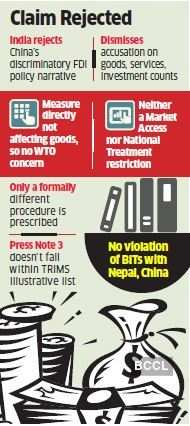
New Delhi: Refuting China’s accusation that India’s revised foreign direct investment (FDI) policy is discriminatory, officials have said that the revision neither restricts market access nor national treatment— the two tenets of global trade-—and is not violative of any rules of the World Trade Organization (WTO).
India, on Saturday, made its prior approval mandatory for direct or indirect foreign investments from countries that share a land border with it to curb “opportunistic takeovers” of domestic firms following the Covid-19 pandemic, a move which will restrict FDI from China.
Terming this move “discriminatory”, China on Monday said these “additional barriers… violate WTO’s principle of nondiscrimination, and go against the general trend of liberalisation and facilitation of trade and investment”.

Officials have rejected China’s claims on all the three counts of goods, services and investment.
Dismissing the claim on General Agreement on Tariffs and Trade (GATT) count, the official said the new norms do not directly affect goods, and also ruled out any link with the General Agreement on Trade in Services (GATS), explaining that the revised policy is not related to market access or national treatment restriction.
“This does not automatically result in any equity cap or restriction. Only a formally different procedure is prescribed,” the official added. The principle of national treatment prohibits discrimination between imported and domestically produced goods and services with respect to internal taxation or other government regulation.
Market access for goods means the conditions, tariff and non-tariff measures agreed by members for the entry of specific goods into their markets.
On the investment front, the measure does not fall within the Illustrative List of the Agreement on Trade-Related Investment Measures (TRIMS), which details the measures that are inconsistent with the obligation of national treatment. “There is no WTO concern,” the official said.
Similarly, since India-China and India-Nepal Bilateral Investment Treaties (BIT) have been terminated, they only apply to investment already made into India prior to the termination.
Therefore, to the extent no retrospective action is taken to negate existing investments, there is no violation of the respective BITs. Incidentally, India is not only country to have tightened its FDI policies.
While Australia has said all foreign investment proposals will be assessed by a review board during the coronavirus crisis to prevent a sale of distressed corporate assets, Germany too has reportedly made the policy stricter to protect its companies.
(Catch all the Business News, Breaking News Events and Latest News Updates on The Economic Times.)
Source: indiatimes.com

